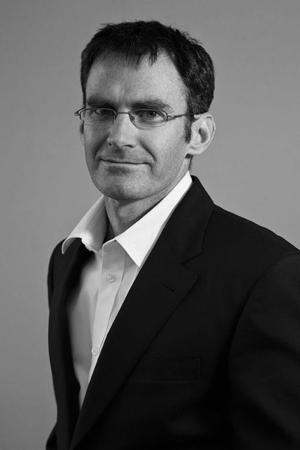11 Oct 2013 | Digital Freedom, News, Politics and Society
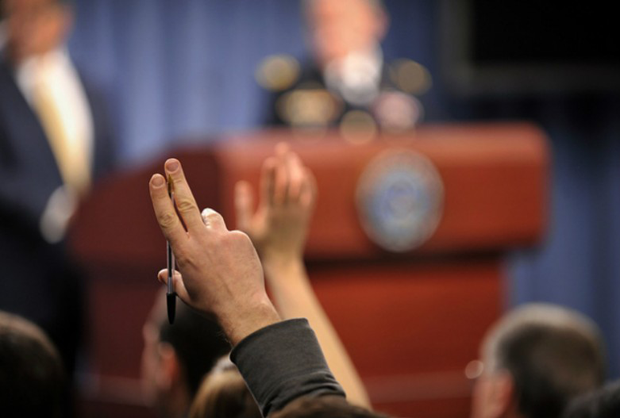
Photo: Flickr user Secretary of Defense
A threat to press freedom is an assault on our right to know.
A new report from the Committee to Protect Journalists tries to capture the invisible impact of the Obama administration’s troubled relationship with the press. The report, authored by Leonard Downie Jr., former executive editor of the Washington Post, and CPJ’s Sara Rafsky, is the most comprehensive look at how the Obama administration’s actions have deeply damaged press freedom and the public’s access to information.
For those who have followed the administration’s policies, court cases and actions related to leaks and the press, the report doesn’t contain a lot of new information. What it does is weave together each of the cases and strategies the administration has pursued, surfacing key themes and illustrating that these examples are not aberrations, but part of a coordinated strategy. Presenting this bigger picture reframes the debate over press freedom in America and reminds us that it’s not enough to tinker around the edges; we need to demand a major course correction.
The report covers the administration’s leak investigations and policies, its surveillance programs, its secrecy and the use of its own media channels to evade “scrutiny by the press.”
All of this is punctuated by the interviews Downie conducted with journalists. Hearing from journalists in their own words, about the challenges they’ve faced and the concerns they have, brings home the seriousness of the crisis in press freedom.
New York Times National Security Reporter Scott Shane captured it best when he told Downie that sources are now “scared to death” to even talk about unclassified, everyday issues.
“There’s a gray zone between classified and unclassified information, and most sources were in that gray zone. Sources are now afraid to enter that gray zone,” Shane said. “It’s having a deterrent effect. If we consider aggressive press coverage of government activities being at the core of American democracy, this tips the balance heavily in favor of the government.”
That shifting balance of power is one of the critical takeaways from the CPJ report. Through efforts like NSA surveillance, the Justice Department’s seizure of phone and email records, and the “Insider Threat Program,” which encourages federal employees to monitor the behavior of their colleagues, the Obama administration has marshaled institutional resources toward efforts that erode press freedom and challenge newsgathering.
“The administration’s war on leaks and other efforts to control information are the most aggressive I’ve seen since the Nixon administration,” Downie writes. “The 30 experienced Washington journalists at a variety of news organizations whom I interviewed for this report could not remember any precedent.”
The report is an important addition to the debate about press freedom, but the scope of its inquiry is limiting. In focusing on the Obama administration, Downie examines in depth the various cases of journalists who have been caught up in federal investigations and the actions of federal agencies only.
As such, the report is not a full accounting of the state of press freedom today. A more comprehensive analysis of troubling state bills, worrisome court cases and the alarming spike in journalist arrests and harassment by local police would give a fuller picture.
In addition, the journalists implicated in the cases Downie reports on are all from mainstream media organizations like the Associated Press, Fox News and the New York Times, and most of his interviews are with Washington editors and reporters from major newsrooms. But the Obama administration’s adversarial relationship with the press has also impacted smaller newsrooms, freelance journalists, independent bloggers and citizen journalists.
The Committee to Protect Journalists has led the way in looking at the impact of threats to press freedom and freedom of expression on digital journalists and citizen reporters abroad. This report should be a starting place for the CPJ to assess the threats and challenges facing all kinds of journalists in the U.S.
It’s notable that, in its recommendations at the end of the report, CPJ calls on the Obama administration to “advocate for the broadest possible definition of ‘journalist’ or ‘journalism’ in any federal shield law.” The law, the CPJ says, must “protect the newsgathering process, rather than professional credentials, experience, or status, so that it cannot be used as a means of de facto government licensing.”
While the CPJ focuses here on the need for a shield law, this recommendation should apply to any law or guideline the administration implements. The shield law is important not only for how it defines a journalist but also for the precedent it could set for future press freedom decisions.
The CPJ also advocates for ensuring that journalists won’t be prosecuted for receiving or reporting on leaks, ending the use of the Espionage Act to prosecute those who leak information to the press, improving transparency about NSA surveillance, enforcing revised Justice Department guidelines, ending the use of overly broad secret subpoenas, and strengthening the administration’s adherence to the Freedom of Information Act.
It’s remarkable that we have to ask for these basic protections and reassurances from our government, but the CPJ report makes it clear that we can’t take press freedom for granted. This report should be a starting point for a much larger discussion that brings together journalists of all kinds, policymakers and everyday Americans to talk through the challenges, questions and concerns about press freedom.
We’re facing a fundamental and coordinated shift in how our government and press interact — and it’s not enough to respond to each attack in isolation. We need to launch a proactive effort to reassert the centrality of a free press in our democracy.
This article was originally published at FreePress.net and is republished here by permission.
9 Oct 2013 | Azerbaijan, Azerbaijan News, News, Volume 42.03 Autumn 2013
In the run up to today’s Azerbaijani presidential election, we publish an article and photographs from Index on Censorship magazine showing how the authorities have cracked down on journalists, activists and artists that criticize the government. These stories of the risks journalist and photographers face show how far the regime will go to silence its critics including intimidation and prison sentences. Writers Rasul Jafarov and Rebecca Vincent document the stories of some of the country’s courageous photojournalists, who have documented what life is really like under President Ilham Aliyev.
“In authoritarian regimes, art can serve as a powerful means of expressing criticism and dissent, subverting traditional means of censorship. Photography is particularly telling, capturing the raw truth and making it difficult for even seasoned propagandists to refute. These photographs, from Abbas Atilay, Shahla Sultanova, Mehman Huseynov, Aziz Karimov, Ahmed Muxtar and Jahangir Yusif, show a side of the capital Baku that contrasts sharply with the sleek, glossy image President Ilham Aliyev’s government seeks to portray. They expose an authoritarian regime prepared to arrest those who document protests and criticism — journalists, human rights defenders, civic and political activists and even ordinary citizens.
But those who embrace subjects others prefer to avoid, exposing unsavoury truths the Azerbaijani authorities would prefer to keep hidden — such as corruption and human rights abuses — do so at significant personal risk and hardship.
As journalists, they face intimidation, harassment, threats, blackmail, attacks and imprisonment in connection with their work, which is seen as direct criticism of the authorities. As artists, they face economic hardship and restrictions on where they can display and disseminate their work.
Most of these images were taken during unsanctioned protests in Baku. Photographers face particular hazards when covering protests in Azerbaijan, as not only can they be injured in the general chaos, but they can also be singled out because of their work. The Institute for Reporters’ Freedom and Safety reports that so far in 2013 there have been 17 attacks against journalists and photographers covering protests.
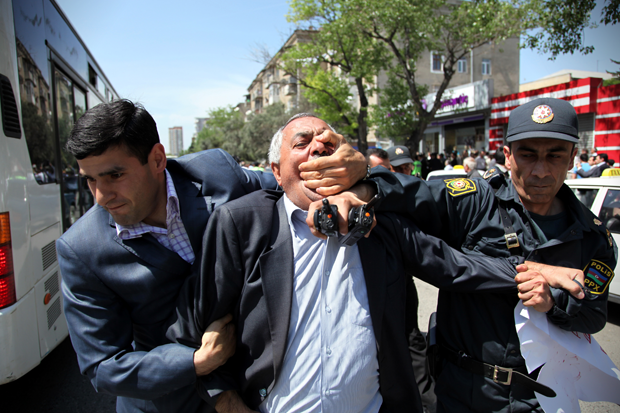
Narimanov Park, Baku, 15 May 2010. Police forcibly detain a political activist during an unsanctioned protest. Photograph by Abbas Atilay
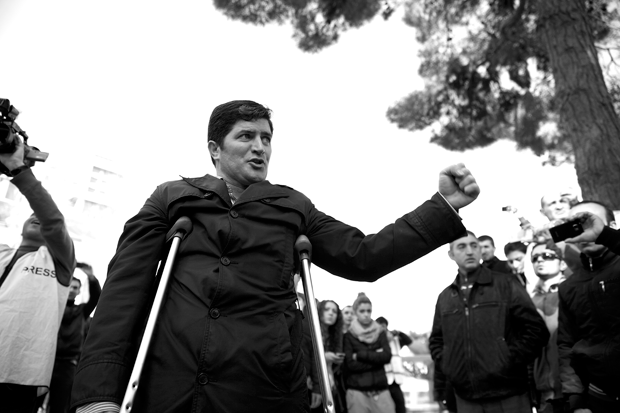
Fountain Square, Baku, 10 March 2013. A political activist during an unsanctioned demonstration protesting the deaths of military conscripts in non-combat situations. Authorities used excessive force to disperse the peaceful protest and detained more than 100 people. Photograph by Jahangir Yusif
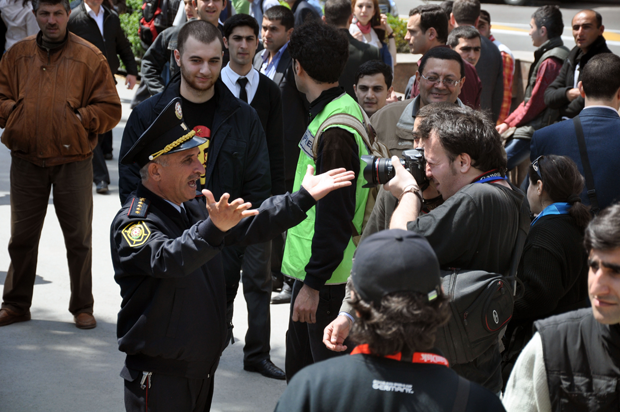
Sabir Park, Baku, 11 March 2011. During an unsanctioned political protest
in the wake of the Arab Spring, a police officer encourages journalists to take his photo. This was a rare move, which the photographer believes was intended to distract photographers from other aspects of the protest, such as police physically restraining protesters. Photograph by Mehman Huseynov
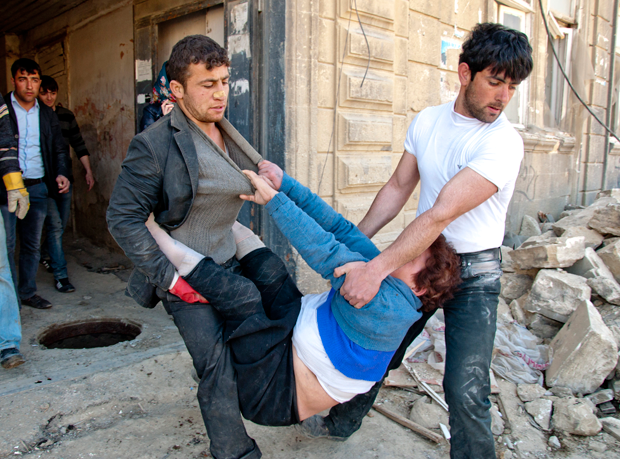
Shamsi Badalbayli Street, Baku, 2 April 2012. A resident is forcibly evicted from the area where the Winter Garden will be constructed. Approximately 300 complaints have been sent to the European Court of Human Rights related to forced evictions from this area. Photograph by Ahmed Muxtar
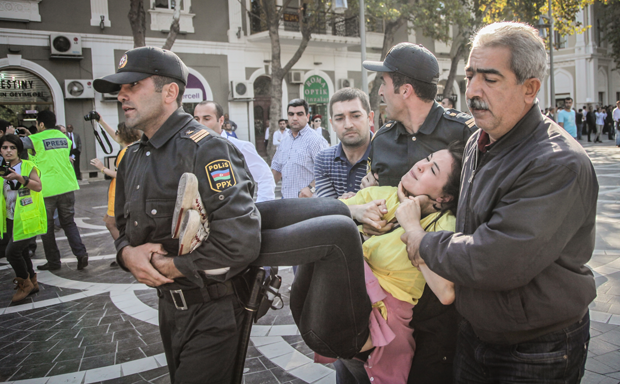
Fountain Square, Baku, 20 October 2012. Police detain a young opposition activist during an unsanctioned protest calling for parliament to be dissolved after a video was released showing an MP discussing the sale of parliamentary seats. Dozens of activists were detained during that protest. Photograph by Aziz Karimov
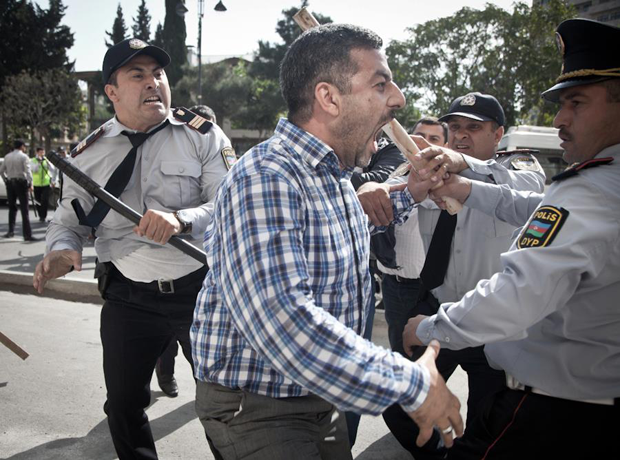
Hijab ban, 5 October 2013. Photograph by Aziz Karimov
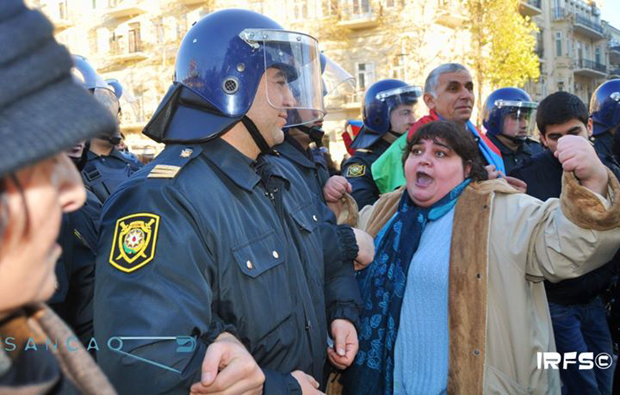
Investigative journalist Khadija Ismayilova confronts police. Photograph by Mehman Huseynov
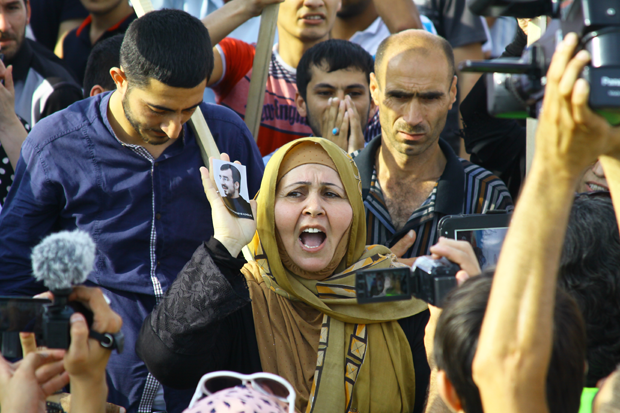
Nevreste Ibrahomova, head of Azerbaijan Islamic Party’s Women Council, holds the photo of an arrested Azerbaijani Islamist and chants freedom to him. Photograph by Shahla Sultanova
Photographers also face arrest and protracted legal action as a result of their work. Mehman Huseynov faces up to five years in prison on politically motivated hooliganism charges stemming from an altercation with a police officer during protests ahead of the Eurovision Song Contest in May 2012. The photographers featured in this story are among the few courageous individuals in Azerbaijan who remain willing to take on the risks associated with this work. They need international support and protection before they, too, become the subjects rather than the artists.”
Rasul Jafarov is the chairman of the Human Rights Club and project coordinator of the Art for Democracy Campaign. Rebecca Vincent is Art for Democracy’s advocacy director. She writes regularly on human rights issues in Azerbaijan
To find out more about the magazine and for subscription options, and read more about stories from the issue click here. These photographers will be part of an exhibition in London this winter. For more details, follow @art4democracy Join us to launch of Index on Censorship’s autumn issue on 15 October. To register for the event, click here.
8 Oct 2013 | Campaigns, Media Freedom
In response to reports that the UK newspaper industry’s Royal Charter proposal will be rejected tomorrow, Index on Censorship Chief Executive Kirsty Hughes said today:
Unconfirmed reports that the Privy Council will reject the newspaper industry’s royal charter proposal should not mean that the political party proposal for a regulator will be waved through. A truly independent self regulator should not be created by politicians. Now is the time to open transparent discussions with the aim of creating genuine independent self-regulation that will ensure the protection of free speech in the UK.”
Since the start of the Leveson Inquiry into UK press standards, Index has warned that there should be no political interference in determining the characteristics or establishment of a press regulator. Establishing press regulation by Royal Charter could allow politicians to meddle in press regulation and threaten media freedom in the UK.
25 Sep 2013 | Uncategorized
Nelson Mandela’s legacy has been “too easily dismissed”, South African editor Nic Dawes tells Index on Censorship magazine in the latest issue.
In an interview for the magazine, Dawes, who has just left his job as editor at South Africa’s Mail & Guardian for a new job at the Hindustan Times, said: “His legacy is being brought back to us.”
South Africa was going through a phase when the people who brought us press freedom “now seek to restrict it”.
“We are going through a very classical process, what happens when a liberation movement has been in power for a while and starts to see its hegemony challenged and then reaches for a convenient lever to limit that challenge.”
Read the full interview with Nic Dawes in the new issue of Index on Censorship magazine.
Listen to the podcast below or click here.










